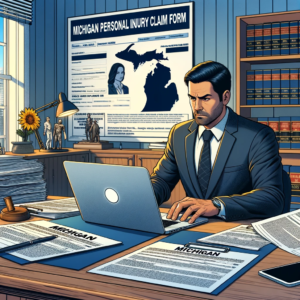Andriacchi Law’s Michigan Personal Injury Lawyers Provide Expert Guidance for Your Claims
Imagine being involved in an accident that wasn’t your fault, and now you’re left to deal with the aftermath – medical bills piling up, lost wages, and not to mention emotional trauma. It’s a lot to handle, isn’t it?
But you don’t have to navigate these stormy waters alone. A skilled and experienced Michigan personal injury attorney can guide you through the complex legal maze, helping you to secure the reimbursement you deserve.
Let’s take a deep dive into the world of Michigan personal injury law. We’ll explore:
- the key aspects of negligence and liability
- the various types of personal injury claims
- the intricacies of filing a claim
- the types of compensation you can seek and
- how to choose the right attorney to represent you.
Key Takeaways About a Michigan Personal Injury Lawyer
- Michigan’s personal injury law is complex and requires demonstrating negligence, which involves a modified comparative fault system where compensation is reduced by one’s percentage of fault unless it exceeds 50%.
- Various types of personal injury claims are covered in Michigan law, including car accidents which fall under a no-fault insurance system, truck accidents, traumatic brain injuries, assault and battery, slips and falls, and dog bites with strict liability rules.
- The personal injury claim process in Michigan includes collecting evidence, proving negligence, and negotiating settlements, typically done by experienced attorneys, with compensation including economic and non-economic damages.
If you have a Michigan personal injury case, Andriacchi Law’s attorneys are here to help. We offer a free consultation.


Strap in, and let’s get started!
Understanding Michigan Personal Injury Law


Personal injury law, otherwise known as tort law, is designed to provide legal recourse for individuals harmed due to somebody else’s negligence or wrongful actions. It’s a vast and complex field. Michigan personal injury law has its unique aspects and nuances.
Navigating this legal landscape can be challenging. That’s where experienced Michigan personal injury attorneys come into play. These attorneys help you deal with complex legal concepts of negligence and liability, which are pivotal elements in any personal injury claim.
Negligence is when someone fails to exercise the care that a reasonable person would in similar circumstances. Establishing negligence is not always straightforward. Sometimes, it requires a deep understanding of the law. Expert testimony may be needed.
Liability is very similar to negligence but not quite the same. Liability refers to the legal responsibility for one’s acts or omissions. Determining who is at fault and thus liable for the damages is a crucial part of any personal injury case.
We’ll further examine these two concepts in more depth in the next two sections.
Establishing Negligence in Michigan Personal Injury Cases
In Michigan personal injury law, the plaintiff – the injured person – must prove negligence. All personal injury claims require it.
But what does it essentially imply? Negligence pertains to failing to act with the degree of care expected from a reasonable person in the same circumstances. Sounds simple enough, right?
Let’s take an easy example of negligence. We all know that when a traffic light is red, we must stop our cars. If the light turns red and we don’t stop, we might hit someone in the intersection and cause a serious accident. Someone could get injured or killed. That’s negligence.
But there’s more to it.
Michigan follows a modified comparative fault system. This means that if a jury finds you partially at fault for your injuries, the judge will then reduce your compensation by your percentage of fault. You can still receive compensation as long as your fault is not more than 50%.
For example, if the jury finds you 1% at fault and your verdict is for $100,000, the judge will reduce your damages by $1,000. You’ll be entitled to $99,000 from the negligent driver.
What happens if your fault is more than 50%?
Then you will not be able to get any non-economic damages. So, if we pretend the $100,000 verdict was all for non-economic damages, you would get nothing.
This is one key reason why you need a personal injury lawyer for your personal injury case.
Proving negligence involves four elements:
- The defendant owed you a duty of care
- The defendant breached that duty
- Because the defendant breached that duty, there is a direct link between the breach and your injuries, and
- You suffered damages as a result.
Let’s return to our car accident example from above. We have a clear duty (stop at the red light), breach (running the red light), and causation (the person causes a car crash). If we pretend that the defendant caused the other person to get a broken leg in the crash, all four elements have been met.
Establishing Liability in Personal Injury Cases
Liability, on the other hand, is all about accountability. It’s about figuring out who is legally responsible for the harm.
In Michigan personal injury law, liability means that a person, business, company, etc. is legally responsible for causing harm or injury to another person. Determining liability can be a complex process involving multiple parties and various factors.
In Michigan car accident personal injury cases, for instance, establishing liability involves proving the same four elements we talked about in the last section:
- Duty of care
- Breach of that duty
- Causation
- Damages
In our above example, the negligent driver is liable for causing the crash: they ran the red light. However, other people can be liable, too.
In Michigan, there is what is called the Michigan Owner’s Liability Statute. This statute says that the owner of the car can also be at fault for the car crash, too.
Let’s assume the negligent driver is a teen driver who is the defendant driver. They don’t own the car, their parents own it. They are driving the car with their parent’s permission.
Under this hypothetical, the Michigan Owner’s Liability Statute makes the parents equally as liable as the teen driver.
This can also extend to others. Another easy example is that an employer is generally liable for their employees’ acts. That’s called “vicarious liability.”
Naturally, there are some limits to this. That’s why you need a Michigan personal injury lawyer to find all the at-fault parties responsible for your personal injury case and hold them accountable.
Types of Personal Injury Claims in Michigan


Let’s shift our focus now to the various types of personal injury claims that frequently occur in Michigan. Some frequent types of negligent actions leading to claims are:
- car accidents
- truck accidents
- motorcycle accidents
- bike accidents
- slips and falls
- premises liability
- negligent supervision
- dog attacks
- assaults, batteries, and other intentional torts
Michigan personal injury law comes into play in all these cases. Each of these presents unique legal considerations. We’ll cover some of them next.
Car Accidents, Truck Accidents, and Motorcycle Accidents
Michigan isn’t known as the world’s motor vehicle capital for nothing. Michiganders love their cars, pickup trucks, SUVs, and motorcycles. Unfortunately with that love comes auto accidents, which leave car accident victims.
Car accidents are a common type of personal injury claim in Michigan. There are two types of personal injury claims that come from motor vehicle accidents. The first is called a “first-party” no-fault claim for personal injury protection (PIP) benefits. The second is called a “third-party” claim against the at-fault or negligent driver.
Let’s talk about first-party claims first. Michigan’s car insurance system is called a no-fault insurance system. This means that your own insurance company will pay for some of your economic losses, such as your medical expenses and lost wages, regardless of who was at fault. An in-depth look at Michigan’s no-fault PIP benefits is beyond the scope of this page.
Let’s move on to third-party claims. If you’ve suffered serious injuries, you may be entitled to additional compensation from the at-fault driver in a third-party claim. This is where you go after the negligent driver for non-economic damages, which are commonly called pain and suffering.
To seek compensation for pain and suffering, you must prove:
- the other driver’s fault and
- your injuries (the physical injuries, mental injuries etc.) qualify as a “serious impairment of body function” as defined by Michigan auto law
A couple of examples showing a serious impairment of body function would be broken bones, traumatic brain injury, or a wrongful death.
There’s also a little caveat to third-party claims. Aside from your no-fault benefits, you might also be able to sue the at-fault driver for excess economic damages, including medical bills that exceed your policy limits or future expenses, and lost wages that go beyond what your policy covers.
If you’re searching for car accident lawyers, give our law firm a call as we help victims with these types of claims.
Slip and Fall Claims and Premises Liability
Another common type of personal injury claim is for slips and falls. Under Michigan law, these lawsuits are technically called “premises liability” lawsuits.
This is when you may be at a business, a friend or acquaintance’s home, or, in some limited circumstances, trespassing on another person’s property. While there, you are injured by something on the land.
In these types of claims, the premises possessor or premises owner may have a duty to protect you from dangers on the land or warn you about certain hazards. For whatever reason, they fail to do so and, as a result, you are injured.
An easy example is when someone visits a business for groceries. While at the business, they slip and fall on water in an aisle when there were no warning signs around.
If you’re searching for a slip and fall lawyer or premises liability attorney, our law firm can help. We also help victims with these types of claims as well.
Dog Bites
As a dog lover myself (we have three), it pains me to say that dog bites are also common. Dog bites might seem less serious compared to car accidents or slip-and-fall injuries, but they can result in significant injuries and emotional trauma.
Michigan has multiple theories of liability for dog bites.
First, Michigan law has strict liability for a dog bite. This means dog owners are responsible for any injuries caused by their pets, even if the dog has never shown any signs of aggression before.
Second, there is an additional theory of liability where the dog had a known dangerous propensity. In these cases, the dog attacked someone previously, but the owner kept it. Then, the dog bites another person for a second time.
In some circumstances, the dog owner can defend themselves against dog bite claims by proving that the person who got bitten provoked the dog, was careless, or didn’t have the right to be on the property when the bite happened.
If you’ve been bitten by a dog in Michigan, you have three years to file a lawsuit for a dog bite incident. Give us a call to discuss your case.
The Process of Filing a Personal Injury Claim in Michigan


Properly filing a personal injury claim is difficult. That’s why you should hire a lawyer to help you.
The process typically involves:
- gathering evidence of negligence, liability, and damages
- trying to negotiate a settlement with the insurance company or other parties
- if negotiations are unsuccessful, then filing a lawsuit
- going through discovery, more negotiations and
- potentially a jury trial
An experienced attorney can help guide you through each step, ensuring your rights are protected and you have the best chance of receiving the compensation you deserve.
We’ll dissect these steps in the subsequent sections, beginning with the collection of evidence.
Gathering Evidence
The first step in a personal injury claim requires collecting evidence. This typically includes:
- Medical records
- Photographs of injuries or the accident scene
- Witness statements
- Expert testimony, affidavits, or reports and
- Any other documentation that supports your claim
Evidence is crucial as it provides the factual basis for your claim and helps establish who was at fault for your injuries.
When it comes to witness statements, it’s important to gather the names and contact details of the witnesses, have them write down their version of events, and if possible, have their statements notarized.
The more evidence you have to support your claim, the stronger your case will be.
Proving Negligence
After you’ve amassed the required evidence, the ensuing step is to establish negligence.
As we’ve discussed earlier, negligence is a key component of personal injury law. It involves showing that the defendant failed to act with the level of care that a reasonable person would have exercised under similar circumstances.
To prove negligence in a personal injury case, you need to establish a duty of care, show that the defendant breached that duty, and prove that there’s a direct link between the breach of duty and your injuries.
Settlement Negotiations
Sometimes you can conclude your claim by negotiating a settlement with the defendant’s insurance company. This sometimes occurs before filing a personal injury lawsuit. It can also happen after as well.
It is during this stage that your attorney will present the evidence and argue on your behalf to secure the best possible compensation for your injuries.
Settlement negotiations can be complex and challenging. Disagreements over:
- insurance coverage
- the extent of injuries
- who’s at fault and
- future medical expenses
These are common hurdles. But with the right attorney on your side, these challenges can be effectively dealt with, leading to a fair and reasonable settlement.
If the defendant’s insurance company simply refuses to settle – which happens often – then you’ll need to take your case to a jury trial. The jury will ultimately decide who is at fault, how much they are at fault, and what a fair appraisal of your damages is.
Let’s discuss damages, also known as compensation, next.
Compensation in Michigan Personal Injury Cases


If your personal injury claim is successful (regardless of if you go to a jury trial or settle before it), you’ll be awarded compensation for your injuries. In Michigan, compensation in personal injury cases can be divided into two main categories: economic and non-economic damages.
Economic damages cover financial losses such as medical bills and lost wages. Non-economic damages compensate for mental anguish, pain and suffering, and other intangible losses.
Let’s look at these a little further.
Economic Damages
Economic damages compensate for the financial losses you’ve incurred as a result of your injuries. This may include:
- Medical bills from medical care
- Rehabilitation costs for medical care
- Lost wages
- Any other out-of-pocket expenses related to your injury.
Calculating economic damages involves tallying up all your out-of-pocket expenses and estimating future costs such as ongoing medical treatment and lost earning capacity. It’s crucial to maintain accurate and thorough records of all your expenses to ensure you’re fully compensated for your losses.
Non-Economic Damages
Non-economic damages are a bit more difficult to quantify as they compensate for intangible losses such as pain and suffering, emotional distress, and loss of enjoyment of life. These damages can vary significantly from one case to another.
For example, if you have a broken pinky, your settlement will be a lot lower than if you suffer life-altering, catastrophic injuries. Both of those damages are understandably less than wrongful death cases.
To calculate non-economic damages, you will need to consider factors such as the severity of your injury (if it is life-altering or not), the impact of the injury on your daily life (does it affect you all the time or rarely), and your age.
Choosing the Right Michigan Personal Injury Attorneys


As we’ve seen throughout this article, there’s a lot that is involved in a single claim. That’s why you need a lawyer with the legal expertise specific to your type of case and the injury you suffered.
Choosing the right personal injury attorney is vital. The right attorney will guide you through this complex legal process, gather the necessary evidence, prove negligence, and negotiate a fair settlement on your behalf.
You will need experienced Michigan lawyers to help you with these types of lawsuits. Only lawyers licensed in Michigan can practice in Michigan, except in special circumstances.
Also, you will specifically want a personal injury lawyer from a personal injury law firm to help you specifically. Some lawyers practice in a “general practice firm,” which, in my opinion, you do not want to hire.
You don’t go to your family doctor for brain surgery, right? You go to a neurosurgeon for brain surgery.
So why would you go to the lawyer who handled your traffic ticket to handle your personal injury case?
We’ll scrutinize these factors more thoroughly in the upcoming sections.
Experience and Reputation
The level of experience and reputation of your personal injury attorney can significantly influence the outcome of your case. An experienced attorney will have a deep understanding of personal injury law and will be able to navigate the complexities of your case effectively.
Reputation is equally important. A lawyer with a strong reputation has likely earned it through a track record of successful cases and satisfied clients.
Check online reviews, recommendations, and the attorney’s discipline record on the State Bar website can provide valuable insights into their reputation and track record.
Communication and Fees
Maintaining open lines of communication with your attorney is paramount to the success of your case. A good attorney will keep you informed at every stage of the process and be available to answer any questions you may have.
As for fees, most personal injury attorneys work on a contingency fee basis, which means you don’t pay unless they win your case. Understanding the fee structure upfront can help you avoid any surprises down the line.
Summary
We’ve covered a lot of ground in this post, from the basic concepts of negligence and liability in Michigan personal injury law to the process of filing a claim and choosing the right attorney. We’ve learned that various types of personal injury claims exist, each with its unique legal considerations.
Personal injury claims are overwhelming, but remember, you’re not alone. A skilled and experienced personal injury attorney can guide you through the process, fight for your rights, and help you get the compensation you deserve.
At Andriacchi Law, we have helped many victims with their personal injury cases. Call now for a free initial consultation about your claim. We take cases on a contingency fee basis.